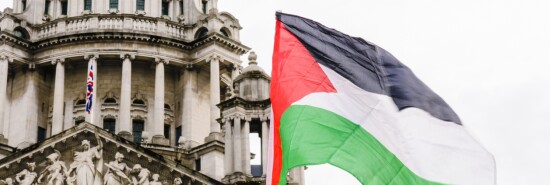
Why Ireland backs Palestinians
Dan Hannan
Video Embed
I have one of those surnames that might be Arabic or might be Jewish. Whenever I travel through Israel’s Ben Gurion Airport, I trigger the ethnic profiling on which its security rests. “What was your father’s first name?” the young conscripts ask. “Where was his family from?”
Ireland, I tell them proudly. And who wouldn’t be proud to be from the place that gave the world Edmund Burke and W.B. Yeats, the place that kept civilization alive at the uttermost edge of the world during the Dark Ages? But I am less proud of my Irish heritage when the subject of Israel comes up.
DISTRICT OF CRIME: HOW RISING CRIME HURTS COMMUNITIES AND THREATENS THE AMERICAN DREAM
When the democratic world rushed to denounce the abominations in Israel after Oct. 7, one country was, as usual, notable by its absence. Ireland first watered down the European Union’s statement of condemnation and then distanced itself from European Commission President Ursula von der Leyen when she declared that Israel had every right to defend itself. She was “not speaking for Ireland, and she wasn’t speaking for the opinions that they hold,” Irish President Michael D. Higgins said.
That might seem a relatively mild statement coming from a man who has, in the past, called for a boycott of Israeli goods, objected to Hamas being labeled a terrorist organization, and agreed to share a platform with Hezbollah (the meeting didn’t go ahead in the event because the Hezbollah man was denied a visa).
But bear in mind that Ireland’s presidency is ceremonial. Higgins is not meant to be a politician but a symbol of the nation. He is supposed to steer away from controversy, to give voice to the feelings of Ireland as a whole.
Sadly, in the aftermath of the Hamas atrocities, that is precisely what he was doing. Yes, some Irish politicians and commentators side with Israel. But they are few. And the strongest nationalists are the fiercest critics of the Jewish state.
Even as news of the attack on the kibbutzim was coming through, Sinn Féin politicians were attacking the victims.
“The violent offensive by Palestinian forces has occurred against a sustained intensification of the Israeli state’s occupation and apartheid in Palestine since 2022,” said Martina Anderson, whose anti-British tirades I used to sit through in the European Parliament. “According to the EU, only Palestine has no right to defend itself against murder, torture, and apartheid,” declared Chris Andrews, a Dublin TD.
Militant Irish nationalism has always sympathized with militant Palestinian nationalism. You can tell which part of Belfast you are in from the flags. If you see the Palestine Liberation Organization banner, you’re in a republican area. If you see Israel’s white and blue, it’s unionist.
Now, don’t get me wrong. It is perfectly legitimate to support the Palestinian people. Indeed, given the calamities they have suffered over the decades, it would be odd not to feel sympathy for them. Still, it is striking that those who become angriest on their behalf show no interest in the horrors being visited on, say, Syrians or Yemenis.
Is it antisemitism? Prejudice against Jews has certainly existed in Ireland. There was a spectacularly ugly incident at the beginning of the 20th century when the Jewish population of Limerick was driven out.
In 1943, a newly elected TD, Oliver J. Flanagan, used his maiden speech to heap praise on the massacres then being perpetrated by the Nazis: “There is one thing that Germany did, and that was to rout the Jews out of their country. Until we rout the Jews out of this country, it does not matter a hair’s breadth what orders you make. Where the bees are, there is the honey, and where the Jews are, there is the money.” Flanagan went on to become a minister and, later, Father of the House.
But, although antisemitism was stronger in Ireland than in other English-speaking democracies, it never became mainstream, as happened in parts of Europe. These days, it is confined to a tiny fringe.
CLICK HERE TO READ MORE FROM THE WASHINGTON EXAMINER
No, what we are seeing here is the veneration of victimhood. Ireland glamorizes Palestinian militants as anti-colonial resistance fighters. Leave aside the curious way Ireland, a disproportionately enthusiastic participant in the British Empire, has reimagined itself as a colony. The truly bizarre thing is to see oppressed status being treated as a moral get-out clause that justifies almost any crime.
It is, of course, precisely this sentiment that leads some Americans to sympathize with Irish republican terrorists who make no secret of their hatred for Western capitalism and who want a form of ethnic cleansing. Victimhood truly is the highest card in the deck.
